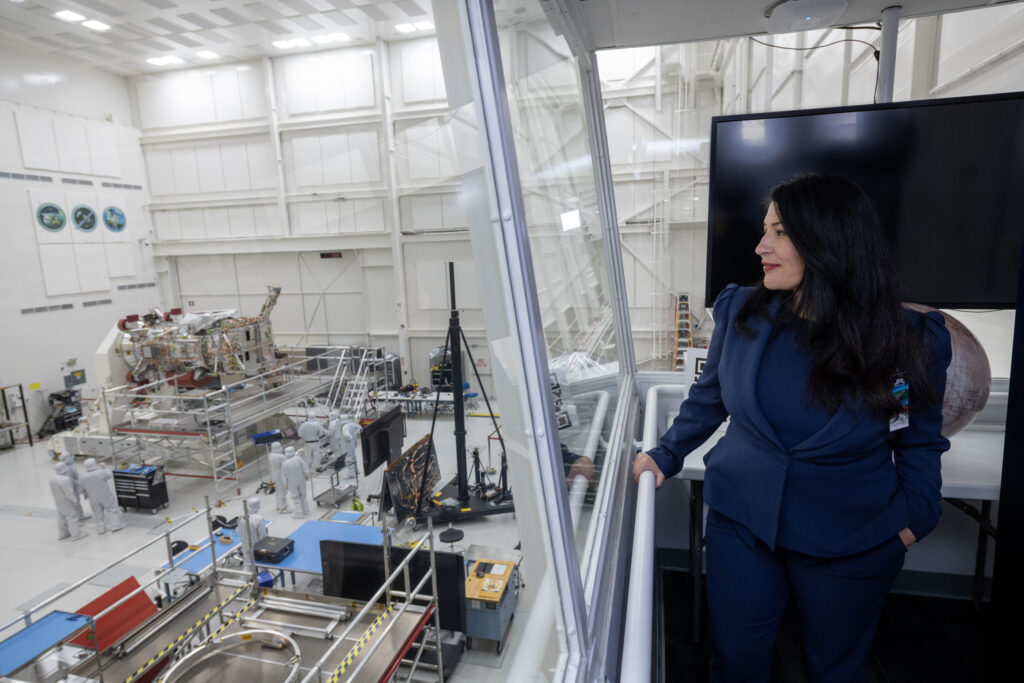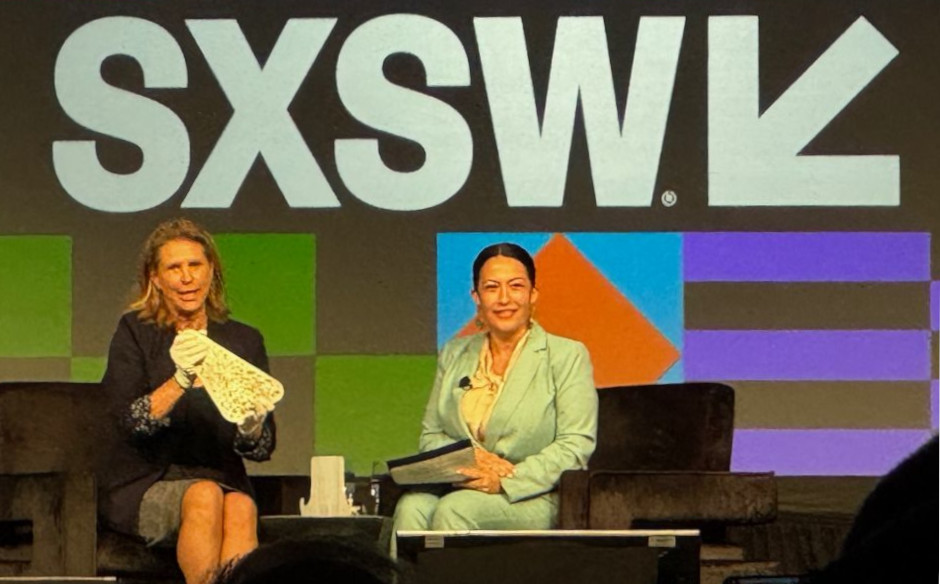Opening SXSW in Austin yesterday was the Poet Laureate of the United States. It was a perfect example of style, grace, artistry and science: the best SXSW opening one could imagine.
Ballroom D at the Austin Convention Center was at its maximum capacity of 2,400 people for the event, as Ada Limón took the stage to discuss her work for the Space agency NASA. In October a spacecraft is slated to be launched to a moon of Jupiter, Europa, which is thought to harbour life in its vast oceans. Limón was invited by NASA to create a poem, which is now inscribed on a metal plate that is part of the spacecraft. The poet was joined on stage by Dr. Lori Glaze of NASA’s Planetary Science Division, shown in the lead photo holding a replica of the metal plate.
In Praise of Mystery: A Poem for Europa is the title of her composition, which she read to the audience at the conclusion. It was enthralling, but scarcely less so was her opening address at SXSW, in which Limón declared “I Come from Old Stars.”
She explained that a poem must resonate with a recipient’s “own internal music, and make something meaningful. It’s music meeting music.” This harkens back to ancient Greece, where poems were often sung, often to the sound of the lyre.
“The collision of the poem with the complex human who receives it makes the full experience of poetry completely unique. For me, poetry is a deeply private endeavour – a deeply personal and human endeavour. As so to transition into a more public role, as an artist, felt in some ways like an impossible task. How do you take something that feels raw, and intimate and strange and ethereal and full of chaos, and show people its importance? In many ways, it’s like trying to explain the soul, or the heart.”
Even though poetry must be given to us via language, Limón sees a paradox here. “Poetry, more than other ways of writing, embraces the place where language fails.”
Limón said the inspiration for her Europa poem came from the “little blue dot” photograph, famously showing the Earth as just a blue dot in the vast emptiness of space. “How can you not have this overwhelming connexion when you realise that all us belong to this extraordinary pale blue dot? In October of 2022 I was asked by NASA to write an original poem that would travel 1.8 billion miles to the second moon of Jupiter. I mediately said yes, and then I was immediately thrown into a wild despair when I realized I would actually have to write the poem!”
In her first meeting the NASA, the scientists explained that Europa is an icy moon almost entirely made of water. That gave Limón the guide she needed to compose the poem. The line she wrote “We too are made of water,” is now the wording NASA has adopted to describe the space mission: the Europa Clipper team have T-shirts that all have the line emblazoned on them. It also provided her the link with Earth: “In order to connect a poem to the second moon of Jupiter, I needed it to celebrate and praise this planet.”
Limón admitted “I know nothing about space, but I know curiosity. What links exploration and poetry so beautifully is our curiosity.”
The Poet Laureate explicated the link between exploring a new world and creating poetry in her answer to an audience question. “In contrast to getting to work with these incredible minds that work for NASA, I get to work in a space that has no answers. Poetry literally gives space for an unknowing. In that way, yes, it is a constant searching, but it is also a little bit of a surrender to the unknowing. There is a part of poetry that feels very comfortable with mysteries, that feels very at peace with now knowing things. It can feel uplifting even when there is something disruptive in it, because it feels like a space to reflect. In that way it goes really well with exploration because you don’t know what’s going to happen.”
Dr. Glaze agreed with this analysis. “We design these spacecraft that go out into the solar system to explore, and we start to answer some questions, but inevitably every time we come back with even more questions. We learned one piece that’s new, and then we have to reset, reflect on what we’ve learned, and start again. The Europa Clipper mission is a really great example of that as it is building on a previous mission that discovered the ocean on Europa.”
Limón took up on the ‘reset’ point made by Glaze. “You were talking about resetting. That’s such a place where poetry lives! It lives in the place to reflect and reset.”
Kudos to the organisers of this years’ event, who had the foresight to create such a spectacular opening session, where we could all reflect and reset to get ready for SXSW 2024.
Visit the official NASA website to hear Ada Limón recite her poem, overlaid on an animation video
https://europa.nasa.gov/message-in-a-bottle/learn/

Lead photo by Dr C Cunningham
